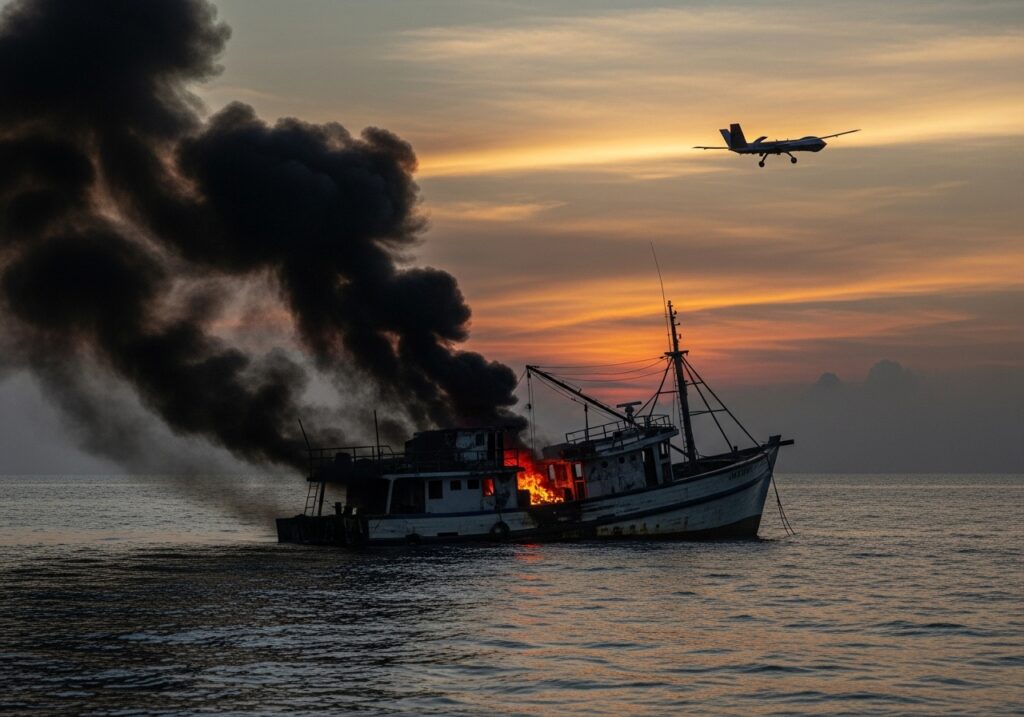The recent U.S. military strike on a Venezuelan boat suspected of drug trafficking has sparked global debate. But beyond headlines and protest slogans, Americans must understand the deeper meaning of this event. It’s not just about a boat or even Venezuela. It’s about how the United States chooses to fight its enemies—and how those decisions can affect our national security, our economy, and our freedoms here at home.
President Trump authorized the strike after intelligence suggested the vessel was linked to a drug cartel. Eleven people were killed. The administration defended the move as a strong message to drug traffickers and hostile regimes. Secretary of State Marco Rubio stated bluntly: “Instead of interdicting it, we blew it up. And it will happen again.”
At first glance, this may seem like a bold but limited military action. However, it signals a major shift in how the U.S. defines war and how it uses military power beyond its borders.
In January 2025, President Trump issued an executive order labeling certain international drug cartels as foreign terrorist organizations. This classification allows the U.S. military to treat members of these organizations like enemy combatants. In other words, the U.S. can now target them with military force even outside traditional war zones.
This is a departure from past policy. Typically, drug traffickers are handled by law enforcement, not the military. By using military force against suspected criminals in peacetime, the administration is blurring the lines between war and crime-fighting. That has major implications.
First, it raises questions about legality. Under both U.S. and international law, the use of military force is supposed to be limited to armed conflicts or imminent threats. If the U.S. begins using drones or airstrikes to target suspects without proving they pose an immediate danger, it sets a dangerous precedent. Other countries could follow suit, using similar justification to carry out attacks in foreign territories.
Second, it could spark retaliation. Venezuela’s government, already hostile to U.S. interests and aligned with adversaries like Russia and Iran, will likely see this as an act of aggression. That increases the chance of conflict not just in Latin America, but more broadly across regions where these alliances operate.
Third, this strategy risks drawing the U.S. into more foreign entanglements. If the military continues to strike suspected traffickers in other countries—Colombia, Mexico, or the Caribbean—it could lead to unintended wars. And history shows that American wars abroad often lead to more surveillance, less freedom, and more government power at home.
There’s historical context to consider. After 9/11, the U.S. used similar authority to target terrorists in Afghanistan and beyond. That campaign expanded over time, leading to drone strikes in Yemen, Somalia, and Pakistan. While some of those operations prevented attacks, others killed civilians and fueled anti-American sentiment. The war on terror became a global, endless conflict.
Now, we may be entering a similar pattern—only this time, the enemy isn’t al-Qaeda but drug traffickers. And the battlefield could include parts of Latin America, much closer to home. This opens the door to even greater military involvement in the Western Hemisphere, which could lead to instability in our own backyard.
It also opens the door to more domestic surveillance and the erosion of civil liberties. In past conflicts, presidents have expanded their powers citing national security. Trump has already invoked old laws, like the Alien Enemies Act, to justify domestic crackdowns. A prolonged conflict in Latin America could give future administrations the excuse to do more of the same.
Finally, this strategy creates tension between federal and state governments. If the military is used more aggressively abroad, it’s only a matter of time before it’s used more readily at home. We’ve already seen this in cities like Los Angeles and Washington D.C., where the federal government has deployed troops without local approval.
In short, the strike on the Venezuelan boat is more than just a single event. It marks a shift in American foreign policy—one that could redefine war, reshape our national security, and impact the personal freedoms of every citizen. As Americans, we must watch closely, ask tough questions, and ensure that the fight against foreign threats does not become a threat to our own liberty.

